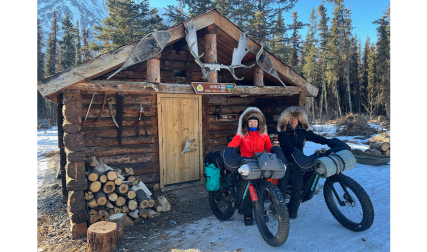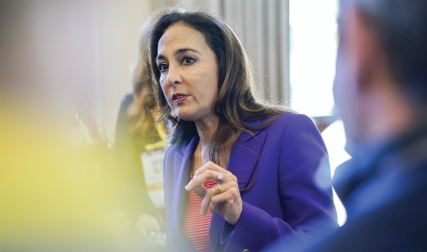National Treasure
DAM’s Grand Canyon trek article and its photographs were incredibly enjoyable [“The Grand Canyon Respects Nobody,” July/August]. Explorer Pete McBride ’93 summed up his message when he said, “We’re mere specks in the timeline. Maybe we need to hear this more often.” Well stated.
I tutor elementary school kids. For a few years I struggled to explain to them how long man has been on Planet Earth. Then it dawned on me that kids would understand all 4.5 billion years of Earth’s history if they were compressed into one year. If planet Earth is “born” on January 1, dinosaurs arrive December 13. They disappear around Christmas Day. Homo sapiens shows up at 11:36 p.m. on December 31. Christopher Columbus arrives in “the New World” 20 seconds before the year ends.
McBride is right. We are specks in the timeline. Planet Earth is fragile. Are we taking care of it properly?
Brian Kingsbury ’75
Spokane, Washington
All In
I want to thank you for the fascinating July/August edition. As a mostly unperturbed regular reader of DAM, several items in this issue jolted me into a state of keen interest. I joined in the stealthy interviewing of the emerging Beatles group in the mid-sixties with Richard Hershenson ’67 [“Meet the Beatles!”], followed by a vivid description of traveling the road with Julie Dunfey ’80, Ken Burns, and celebrated country singers [“On the Road Again”].
The frenetic pace slowed with the opportunity to enjoy a tribute to English professor Jeffrey Hart ’51 [“Losing Hart”], a tribute that made me regret I never had a class with him. Then I joined an exhausting hike [“The Grand Canyon Respects Nobody”]. I caught my breath and learned something of the intricacies of audiobook narration revealed by Sarah Mollo-Christensen ’03 [“The Voice”]. Last but not least, I vicariously experienced an unusual and gritty “down and out” cross-country journey with Peter Kaldheim ’71 [“American Odyssey”].
Yikes! I feel the need to return to Dartmouth and start over again, so I get the chance to create a new life path. Seriously, thank you for loading the July/August issue with so much good stuff. DAM now has a very high bar to clear!
Edward H. Temple ’66
Beaufort, South Carolina
A Sense of Place
“Dear old Dartmouth, set a watch, Lest the old traditions fail,” go the lyrics of the alma mater. Now is the time to set a watch. The current administration, while giving lip service to Dartmouth’s traditions, is systematically seeking to abandon our most basic traditional structures.
President Hanlon claims that “at the core of who we are” is a “profound sense of place” [“Looking Ahead,” July/August]. Yet in 2017 the administration floated a plan to expand the College by potentially destroying the Shattuck Observatory for dorm space. The physics and astronomy department opposed the proposal, noting it was the first building constructed solely for scientific research at Dartmouth. This ill-conceived plan was scrapped.
Now the administration is studying the possibility of either closing the Dartmouth golf course or cannibalizing several of its most picturesque fairways and greens to accommodate future expansion. The golf course website notes it is “Dartmouth College’s oldest existing recreational and athletic facility.”
Targeting for possible elimination traditional place structures does not fit President Hanlon’s assertion that the sense of place is “timeless” and remains at the core of who we are. It also makes no economic sense. Two alums have pledged a total of $10 million if the golf course is preserved and enhanced.
Now is the time to set a watch. If you retain what John Sloan Dickey ’29 called “place loyalty” and want to preserve old traditions, speak in a language the administration understands: Take a few dollars off your next contribution to the College. “Dare a deed for the old mother.”
Tony Roisman ’60
Weathersfield, Vermont
Seventies Story
Congratulations for the interview with former DAM editor Dennis A. Dinan ’61 [“Continuing Ed,” July/August]. It was an overdue tribute to an excellent journalist whose story is a telling part of the history of attitudes of the seventies.
Bruce Ducker ’60
Denver
Burning Issue
Dartmouth plans a $200 million investment in a new woodchip-burning plant to power the College [“Campus,” March/April]. At my 50th reunion the issue of power for the future arose, and I have been interested in how it would be resolved. Considering the resources of the engineering school and Dartmouth’s economists and investment experts, I wonder how they decided on this alternative as opposed to solar or wind. It seems as though burning woodchips still puts harmful substances in the air.
I think this decision deserves more substantial coverage and explanation.
H. Clarke Gentry ’66
Oakland, California
Tuition—Or Not?
When is Dartmouth going to grant free tuition for undergraduates? Students could still pay for room and board, keeping skin in the game, and most would have to work or borrow money to pay for that.
The decision could be phased in—cut tuition in half and reduce it 10 percent a year for five years (or 5 percent a year for 10 years), so it doesn’t shock the budget and College operations at once.
At the current tuition of almost $55,000 [“Campus,” May/June] times 1,000 students, that’s $55 million a class. Multiplied by four years that is $220 million in tuition per class or $220 million per budget year. Its absence would leave a hefty hole in the College’s $1 billion annual budget.
Dartmouth’s endowment is $5.5 billion. Even with average endowment investment returns—say, 10 percent—Dartmouth could offer free tuition from its investment returns ($550 million a year) and not touch the endowment’s principal. No longer charging tuition would mean roughly half the College’s budget would come from investment returns. This would also mean an end to raising tuition each year.
The College could stop offering scholarships. The average need-based grant for the class of 2020 was a laudable $46,237 per student. In the 2020 academic year, Dartmouth will distribute $111 million in need-based scholarships. Tack that $111 million to the amount available to make tuition free, and the budget hit would be cut to about $110 million a year.
The College can open its doors to everyone regardless of ability to pay. It’s time for another generation of leaders to make their mark, as the Dartmouth Plan did almost 50 years ago.
Steve Bell ’76
Buffalo, New York
Change of Hart
After reading about conservative icon Jeffrey Hart and his dismay with G.W. Bush, who he thought was at the “bottom among American presidents” and his subsequent switch of allegiance from Republicans to Democrats, including campaigning for Barack Obama, one must wonder how many regrets he felt during the last two years of his life about his previous lifelong support of the GOP.
What responsibility did he acknowledge for mentoring Dartmouth students such as Dinesh D’Souza ’83 and Laura Ingraham ’85 and the subsequent placing of Donald Trump in the White House with all its catastrophic results, which include degrading the international reputation of the country Hart so loved, wrecking congressional norms, attempting to destroy the Constitution, attacking the free press, embracing murderous dictators, shunning NATO allies, and enabling criminal corruption within the government?
Stan Phaneuf ’70
Newbury, Vermont



